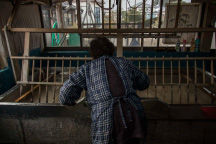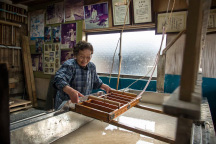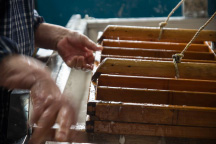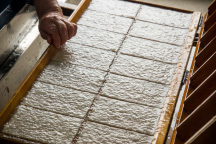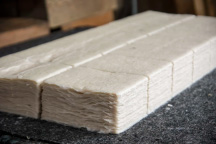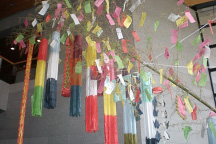
Yanagiu Washi
Japanese paper which was loved by
Leader of Japanese folk art movement
Washi is a style of Japanese paper and papermaking that has been handed down through craftsmen over 1400 years. The characteristic of Washi is its strength because of the longer fibers used in its construction. Washi is used to make various everyday items like clothes and household goods.
There are different kinds of Washi, and one of them is the Yanagiu-Washi, started in Yanagiu area in Sendai over 400 years ago. In the Keicho period (1596-1615), the first Sendai clan lord Masamune Date called for paper craftsmen from Moniwa-village (present Fukushima city) to Sendai to create Washi.
The Sendai area is suited to produce a lot of Washi because it is blessed with having the essential conditions of tons of nice ground water and strong, dry winds, which is called “Karakkaze”.
"Kyosei-shi" is a popular type of Yanagiu-Washi. The procedure to make Kyosei-shi includes coating the paper with konnyaku powder dissolved in water. They then boil the paper in hot water with calcium hydroxide, wash, rub and dry. Kyosei-shi is resistant against water and friction so that it won’t be fluffed up. That is why Muneyoshi Yanagi, leader of Japanese folk art movement, loved Yanagiu-washi and used it for binding of his private printing books “Kogeibunka” (culture of craft-art) and “Bi no Moyou” (pattern of beauty).
The peak of Washi production was in the Meiji and Taisho period (1868-1926). There used to be over 400 Washi paper makers around the Yanagiu area but a lot of mass produced cheap paper took their place. In the 1960’s, only 10 paper makers ran their Washi business, but now only one, “Yanagiu-Washi Kobo” by the Sato family still runs. Now they produce Yanagiu-Washi for postcards and calligraphy paper and wrapping paper. It is also used for the certificate of the elementary and junior high schools of the neighborhoods and the demand for lampshades and interior decoration items is increasing the need to create Washi. These traditions have protected the use of Yanagiu-Washi and has allowed this craft to be handed down to the next generation.
Yanagiu-Washi Workshop
32-1 Yanagiu Kamikawara, Taihaku-ku,
Sendai, Miyagi
981-1106 JAPAN
For more information :
info@tetotetote-sendai.jp











